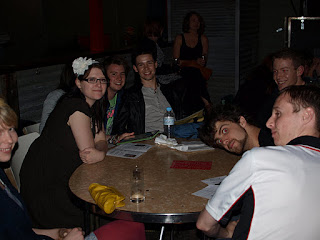Delana began by throwing open a question to the audience regarding collective nouns. What would a collective noun be for a group of writers? Considering so many were present at the event one might have expected a few more suggestions from the crowd, but Delana sorted it out for us anyway, deciding, quite rightly, that ‘a creation of writers’ might be most appropriate. ‘An anxiety of writers’ as well as ‘a paranoia of writers’ came pretty close runners-up.
With nods of approval from those present the delightful Delana then threw over to Mario Pilla who gave a hearty plug for the new Speakeasy Zine, available for the first time on the day. Then we truly got under way with what everyone had come for: the readings. There were a lot of new faces to the podium this time round, and some familiar ones too.
Piri Eddy kicked off proceedings with his hiphop stylings, lamenting the difficulties of domestic chores, while alerting us to the fact that he could quote just about every episode from the first ten series of The Simpsons. Next up was Sean Stockham, a new face to the stage, who drew the audience in with his sinister yet melancholy ‘Strangers’. Alice James read her fitting ‘The Library’, about a girl’s love for her mother’s collection of books, while Susie Nelson’s moving piece reflected on her memories of her grandmother.
Dominiek Neall rounded off the first set with her hilarious short story ‘Me and Pluto Down by the Milky Way’, about the often astronomical trails of friendship. After a quick break, in which the majority of copies of the new Speakeasy Zine were snapped up, Chris Williss grabbed the crowd’s attention once more with his imitations from 007 and Back to the Future in a ‘literary fiction story about a guy trying to write a literary fiction story.’
Scarlett Pinhorn-Veasey warned about the dangers of having parents who unwittingly leave you stranded behind at petrol stations, while Kenneth Nixon taught us about the joys of life through touch in his story ‘Tactile Living’.
Caysey Sloan then stepped up to read a section from her project for NaNoWrMo - that arduous challenge to write a novel in a month - and Peter Beaglehole finished off the second set with a piece reflecting on those awkward moments in conversations we’ve all experienced, as well as doing a fairly convincing impression of yelling at dogs, which was so loud that it snapped this reviewer bolt upright in her chair.
The final set started with Samuel Williams, who read a series of ninety-nine word stories dealing with a range of topics from snake tattoos to footy crowds and violinists, as well as the things that can happen on the way to find Harry Potter. Miranda Richardson delighted with a tale of talking fox spirits, asserting that if you make people promise you things they’ll be yours forever.
Luke Bartholomew bemoaned the curse of too much luck, at least until love gets in the way, and Melanie Pryor’s wordsmithery of song lyrics and lone musings drew the audience into her ‘Melodies of the Midnight Hours.’
Mario Pilla capped off the readings with some thoughts about excretion and secretion, making some audience members concerned that he may have already ‘catharted’ on a few chairs in the venue.
After giving away some very impressive door prizes the proceedings came to an end, and a few drinks later we had wrapped up the last Speakeasy for 2011. But, never fear! Speakeasy will be back in early 2012, and hopefully we’ll be seeing all of the faces from this event again next time around.








 Review by Alicia Carter
Review by Alicia CarterAlicia Carter has just finished her second year of a Bachelor of Arts at Flinders University, majoring in Creative Writing. She has also recently embarked on her journey as Assistant Director for Speakeasy.











































